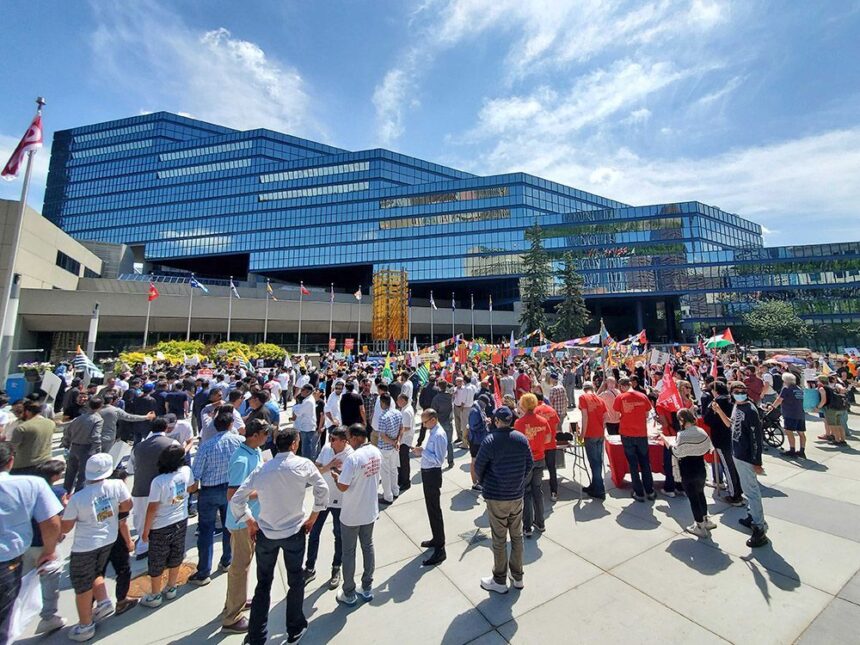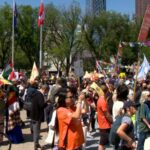The downtown core resembles a fortress this morning. Walking to my office near the Telus Convention Centre, I counted at least seven security checkpoints and more officers than I’ve seen in my fifteen years covering Calgary news.
With world leaders arriving for the G7 Summit, our city has transformed overnight. Steel barriers now line Stephen Avenue, and concrete blocks create a perimeter around hotels hosting international delegations. Local businesses within the security zone received special access passes yesterday, though several cafe owners told me customer traffic has already dropped by 40%.
“It’s like we’re living in a different city,” said Marisa Chen, who owns a boutique just blocks from the summit venue. “I understand the security concerns, but this will hurt our bottom line during what should be a busy week.”
Police Chief Mark Wilson confirmed in yesterday’s press briefing that over 3,000 additional security personnel have been deployed across Calgary. The operation involves coordination between the Calgary Police Service, RCMP, and several international security agencies.
“This represents the largest security operation in our city’s history,” Wilson stated. “We’ve been planning this for eighteen months and remain confident in our preparations.”
The security measures come as protest groups have begun gathering at Olympic Plaza. By noon today, approximately 500 demonstrators had assembled, representing environmental organizations, anti-poverty advocates, and indigenous rights groups. Their numbers are expected to swell to several thousand by tomorrow when leaders officially begin discussions.
Sarah McTavish, coordinator with Climate Action Calgary, explained their presence: “These leaders control policies affecting billions of people. We’re here to ensure they can’t ignore the climate emergency while meeting behind closed doors.”
The Alberta government confirmed additional security funding of $18.5 million last month, supplementing federal allocations exceeding $120 million for the three-day event. Premier Danielle Smith toured the security perimeter yesterday, emphasizing the economic benefits of hosting while acknowledging disruptions to downtown residents and businesses.
For downtown resident Tom Yakichuk, the disruption is tangible. “My commute now takes 40 minutes instead of 15. I need to show ID just to walk to my apartment,” he said while waiting at a checkpoint near 7th Avenue.
Local hotels report being at capacity, with room rates averaging three times their normal price. Tourism Calgary estimates the economic impact at approximately $70 million, though this figure doesn’t account for losses to businesses affected by security restrictions.
Calgary Transit has implemented significant route changes, with the C-Train running modified schedules through downtown stations. Riders are experiencing delays averaging 25 minutes according to transit officials.
City Councillor Jyoti Gondek expressed mixed feelings about the summit’s impact. “We’re proud to showcase Calgary on the world stage, but we must acknowledge the real challenges this creates for residents and businesses. The security measures, while necessary, have essentially cut our downtown in half.”
The G7 agenda focuses heavily on global economic stability, climate initiatives, and international security concerns. Foreign Affairs Minister Mélanie Joly emphasized the importance of the Calgary location during her arrival statement at the airport.
“Calgary represents the perfect balance of energy expertise and environmental innovation,” Joly noted. “These discussions will shape policy directions that affect Canadians directly.”
For protest organizers, the security measures feel excessive. Indigenous rights advocate Robert Cardinal of the Tsuut’ina Nation expressed frustration about designated protest zones being positioned far from the actual summit.
“They’ve created a situation where leaders won’t see or hear legitimate concerns,” Cardinal said. “This security bubble shields them from the very people affected by their decisions.”
Police have established a dedicated processing facility at the former Greyhound terminal to handle potential mass arrests, though Chief Wilson emphasized their approach would prioritize de-escalation.
As someone who’s covered numerous major events in our city, the scale of this operation exceeds anything previously seen – even surpassing the 1988 Olympics security presence. The transformation of familiar streets into checkpoints and barriers creates an unsettling backdrop for what officials continue to frame as Calgary’s moment on the global stage.
The summit runs through Friday, with normal operations expected to resume by Monday morning, though several business owners I spoke with wonder if the economic benefits will ultimately outweigh their losses during this disruption.







